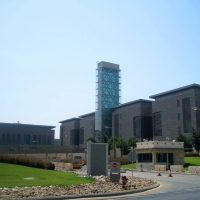In Indonesia, we must respect people who are older than us, especially the elderly. We are expected to kiss their hands whenever we meet them, bend our body whenever we pass in front of them and talk politely to them. We cannot call them only with their names. We have to attach Mr, Mrs, uncle, auntie, et cetera in front of their names. These unwritten rules are applied to most Asians as well, e.g. Koreans, Malaysians, and Japanese people. Similar rules are also practised in Saudi Arabia (and most Arab countries). Except that, shouting at each other seems a normal thing for them. Perhaps that’s how the Arabic people talk; they shout as if they’re angry, but they are NOT actually angry (exception: Syrians, Lebanese, Moroccan, etc). So how do you distinguish a person when he’s angry and in a normal state? Listen to what he says! I lived in an apartment when I was a kid. I had an Egyptian neighbour. All I could remember about the family members was: they shout at each other frequently! The mother, the son, the father shout very loudly until we could hear them. Words like hayawan, himar and kalb spiced their ‘conversation’. And yes, they were indeed fighting. How about in Australia? Well, as a person who had never watched Simpsons or any American TV shows before and never been to the countries of bule, I was quite surprised to find the relationship between young and elderly people here. As I mentioned in my previous post, I lived in a student dorm called The Lodge when the first time I arrived in this country. There were 2 elderly women on my floor who seemed to be much older than my mom. One of them studied at a college, doing some small courses, and the other woman did something, which I honestly forgot. They were the oldest people living there. And everyone called them with their names. No one called them Mrs. A or Mrs. B; we simply referred them as A or B. When I talked to them, I felt like we were equal; I didn’t have to bow or pretend to be nice or polite to them. It’s not like I didn’t like to bow or anything like that; it just felt different. I didn’t have to hide my feeling when I didn’t agree with what they said — I just told them what my opinion was and they had no problem with it. At the University, we never address our lecturers using any titles, be it Mr, Mrs, Dr, or Professor. Rather, we call their names straight away: Paul, Steve, Peter, Fiona, etc. In the office where I currently work, I call my boss only with his name. At first, it felt weird to address someone who is older than you without any titles. If you do it in Indonesia, people would think you’re impolite. But after a while, I get used to it.
One amazing thing about Australia is that the Aussies try and work together to preserve their environment. Millions of dollars awareness campaigns are spent every year. For example, supermarkets all over Australia started a campaign a few years ago about reducing the use of plastic bags. People are encouraged to buy the environmentally friendly green bags which cost less than $2 each so that they can reuse the bag when they do grocery shopping. Incredibly, everyone supports the campaign. Nowadays you can see people carrying these green bags to supermarkets, universities, and even malls ;). The same thing also happens when it’s reported that Southeast Queensland is experiencing the worst drought in 100 years. Everyone is trying so hard to reduce the consumption of water. People would collect the water when taking shower to be used for gardens and even collect the rainwater to top up the swimming pools! For me, it’s quite amazing to witness how water in this dry country is valued so much — even though many options are still available for them, e.g. desalination and recycling. In Jeddah, water is considered very cheap and can be easily accessed. As a result, people would use water excessively. FYI, water is acquired from the sea and desalinated by a Saudi water company for consumption. Then the water trucks come to every house in Jeddah and fill in the wells at least every two weeks. So, no matter what — whether it’s summer or winter… whether there’s El Nino or El Nina — water will always be available. But of course, there is an exception. A problem like this occurs in Jeddah almost every single year (other exception would be a natural disaster — but it’s very rare). All of the sudden, the water trucks never came to our house. Water in the well was steadily decreasing. And the whole city was in chaos. Surprisingly, people do not aware that THEY NEED TO CUT DOWN THEIR CONSUMPTIONS OF WATER. They blame the government for not handling the situation accordingly. Well, yes… there’s something wrong with the water distribution company. But heyyy… instead of complaining all day long.. why don’t they just save water. If many people try to cut down the water consumption, it would at least decrease the possibility of the water crisis, right?? 😐 There are also few awareness campaigns established by the government. Even if there is, people don’t seem to care about it! The same thing happens in Indonesia as well. People still throw litter on the street even though a poster or banner that says “Buanglah sampah pada tempatnya” can be seen EVERYWHERE. What a shame.
In Jakarta, many people care too much about you: what you wear, which brand your gadget is, etc. People would ask you innocently why your mobile phone is so damn old and why you don’t buy a new one (Excuse me, I’m much poorer than you are!). It happened to me more than twice. I was surprised to find out that in Australia, there still exists non-coloured mobile phones! Well, perhaps they’re no longer available in the market. But some people still use them. No one cares whether or not the model of your mobile phone is the oldest one in the world, nor does anyone care to know why you still keep the old-fashioned phone. At uni, you can pretty much wear anything you want. You can even go there barefoot! And yes, I saw some students walking without shoes at uni — I don’t know if they intentionally did it, or if something happened with the shoes. But I saw it on a number of occasions; not only at uni, but also in the City, malls, and park. No one seemed interested in bombarding them with innocent questions. And they didn’t feel ashamed either. The same thing happens to professions. I remember that om Nadir told me about a UQ lecturer (perhaps a Professor; I forgot) who proudly told him a story about his son whose job is a massager. Yes, he’s indeed very proud. In Indonesia, a person who works in a respected position would NO FREAKIN WAY telling anyone about the fact that his son is a massager. Man, that’s like an embarrassment to the family! But the majority of people here don’t feel that way. They don’t feel ashamed of the job they’re doing. A friend of my housemate who is a PhD graduate works as a waitress in a restaurant (yes, no kidding). Some people who have their own business and company would spare their time on the weekend to be a taxi or bus driver. None of them feels ashamed about it either. Perhaps, the reason is that no matter what job you’re doing here, you can still live and survive. However, that’s not the case with the jobs exist in Indonesia and Saudi Arabia. Practically, you’re not able to support your family if you’re a waiter, taxi/bus driver, or shop assistant. Surely, those are the jobs that few unemployed Saudis want to do (even though they’re poor and unemployed).
There are many restrictions and limitations when you live in Saudi Arabia and hold a residence visa. You must have a Saudi sponsor whose job is to “look after” you. According to the government’s rules, once you arrive in the Kingdom, you must give your passport to your sponsor; you’re not allowed to keep it. The reason? Simple! So that you can’t escape! 😀 When you go out of the house, you must bring your iqamah. Iqamah, known also as an internal passport, is a residence permit issued by the government. Residents who don’t bring their iqamahs, if caught by the police, would have to spend their time in jail and wait until their sponsors release them. You also have to deal with unbelievably slow Saudi bureaucracy for numerous occasions: renewing your iqamah (every two years), obtaining an exit & re-entry visa (everytime you want to travel out of the Kingdom, you MUST apply for this troublesome ineffective visa), and obtaining a permit/letter to travel within the country! As a foreigner, you are not allowed to own a house or business. You can buy a house, but it must be named after a Saudi (in the certificate, the name of the owner must be a Saudi). You have access to free health services and education (although quite limited), and your income will be 100% tax-free! 🙂 Most of the things that you’d like to do in this country depend on your sponsor’s permission. For example, you can’t quit and find another job and travel within/out of the Kingdom without his permission. Everything involves money when you have to deal with your sponsor, and unfortunately, many people are disadvantaged and cheated because their sponsors have a full control of them. Thank God my family’s sponsor is indeed my father’s close friend. He practically allows us to keep our passports (this is quite rare by the way). He also gives my father his office’s rubber stamp, so that we don’t have to ask him a permission or whatsoever every time we want to deal with Saudi bureaucracy. He gives my dad a freedom to do ANYTHING he wants with his business. And believe it or not, he NEVER asks us for money, even a single cent (a sponsor can be treated as a profession. You get profit out of it hehe). My mom told everyone that he’s the best sponsor in the entire Kingdom! 😀 Anyway, let’s move on to Australia. The Australian regulation is not as complicated as in Saudi Arabia. In this country, once you hold a permanent residency visa, you have most benefits that Australians receive, except for voting rights. You are entitled to free health services, domestic fees for education (which is 5 times much cheaper than international fees 🙁 ), tax benefit after giving a birth, and so on. You can travel within or out of Australia freely; you don’t have to ask for permission or whatsoever. You can even visit New Zealand without a visa. And of course, you are allowed to own a house and business for as many as you want :P. No wonder many people want to apply for Australian permanent residency! 😀
Previous post: Life in 3 Different Countries – Part 1



18 Responses
Halloo main lagi kesini… Oh ya, kira2 3 tahun lalu aku pernah ke Ausie /tour keliling Ausie… Kepingin kesana lagi nih… Salam saja dari Kota Bengawan – Indonesia
Bila tidak keberatan boleh tukaran link nya??
Mell, nice entry nih. Gw jadi tau tentang hal baru dari entry ini.
nice life, salam kenal 🙂
I’ll never forget one particular fact about Arabs (i dunno if this applies to all Arabs, but this is what I found about Jordanians): mereka sama sekali gk sungkan2 marah2 or bentak2 ke orang lain yg gk gitu deket ma mereka, huhu. Waktu itu landlord gw di jordan sampe yelling ke bokap gw gitu face-to-face, n it was all because of me & my bro, tp gk nyangka aja marahnya gk tanggung2 bo! Klo org indo kan biasanya klo marah ama orang yg gk gitu deket ya bakalan ditahan2 lah amarahnya, unlike Arabs who won’t hesitate to let it all go 😀
perasaan koq postingnya pake bahasa Inggris yah… emang yang comment ama yang baca orang inggris semua ???
eh,gue juga sering mikir kaya’ gini lo.. cultural shock kali yah kita yg hidup bukan dinegara sendiri.
maksudnya, menghargai dan menghormati orang yg lebih tua itu nggak harus dgn manggil pake title something,…yang penting niatnya ya…tapi ini keunikan beda barat ama timur
–
risih kalo diJakarta ngeluarin hape,hape yg nggak up to date.. bakalan ada celetukan.. ‘haree genneee hapenya belom ganti…’
bedanya lagi,,tapi ini cukup menunjukan karakter suatu bangsa… orang Indonesia tuh gila title kayanya… sampai dikartu undangan pernikahan pun gelar sarjana harus dicantumin…malah pernah liat batu nisan nyantumin gelar akademis…
segitu pentingnya kah title… budaya sebagian orang Padangpun juga lucu… kalo pengantin prianya dibayar sesuai gelarnya..gag tau deh adat ini masih berlaku apa udah sadar diri.. mangkanya cewek Padang males punya cowok Padang… contohnya saya sendiri hehehe..
To ctrlz: good point on the “title” thing!
upar: oh yah? Aussie bagian mana nih?
Vita: makasih 🙂
zen: thx. salam kenal juga.
Dessy: Ooooohhh di Jordan begitu juga toooh! Hehehe. (yah sama2 Bedouin juga…) Yah intinya mereka tuh hampir sama lah.. teriak2 en marah2 gitu. Wah lo dah pernah ke Mesir belom??? Lebih parah lagi itu mah! Di jalan raya nih yah, kalo ada tabrakan mobil… gak cewe, gak cowo, gak nenek2, gak kakek2.. semuanya teriak2 marah2.. Kalo perlu maen fisik!! jadi tontonan org2 setempat heuheuehe. Parah deh emang.
Orang Syria en Lebanon deh yang paling lembut hehehe 🙂 Lembut sekali deh, ramah bgt..
ario dipoyono: oh baru nyadar yah? perasaan emang dari dulu tuh pake bhs inggris 😀
you need to ask yourself: emangnya cuma yang nulis komentar aja yang baca?
saya udah bbrp kali dapet email dr pembaca yg bukan org indo. that’s why i always write in english…
ctrlz: Benaaaar sekali!! Hahaha. Baru nyadar gw! LOL. Tapi gw baru tau loh, kalo batu nisan juga jadi sasaran! hahaha. Gw juga pernah ngeliat profil dosen gw, disitu ditulis dia cuma punya satu gelar akademis. Pas gw liat education historynya… wah wah.. bejibun boo! Kalo org indo nih yah, semua gelar nya pasti dicantumin… berderet kaya kereta api.
Sudah aku add link kamu lho…
Pokoke, disini lebih enjoy deh mel. Aku sendiri sangat meragukan prinsip hidupku yang sekarang kalau emang kudu diterapin di Indo..? wah gak ku ku deh!
disini aja ada yang nanya sama aku(temen br dateng dari Indo nih) kok aku masih pake HP jadul…? kok peralatan dirumah masih gak matching? de el el deh, capeee kan?
hello! kesasar dari twitter nih.. wah, kayaknya rame ya di Aussie, ada program post-graduate buat dua taun lagi ga? hehehe.. (berencana jadi dosen muda)
btw, paling setuju sama puncline yang inih :
In Jakarta, many people care too much about you
I really love your cross-cultural comparisons… so interesting, and first hand experiences!
btw, org Jerman tuh lebih kaku dan juga lebih mementingkan sapaan Herr, Frau usw. Kalau dosen juga, biasanya dipanggil Herr atau Frau… kecuali dia masih muda banget dan classnya kecil alias ada suasana akrab… tapi biasanya ya tetep Herr atau Frau…
dulu waktu aku ke Belanda, juga sempat merasa gak enak, diminta manggil para dosen dengan nama depan mereka… soalnya dari feeling Jerman saya, kok gak sopan banget ya….
“No wonder many people want to apply for Australian permanent residency!”
hmm… are u want of them? 😀
Ich: terimakasih udah share 🙂 saya jadi tau skrg di jerman ternyata spt itu. kirain di semua negara barat, kulturnya sama.. saya jd harus berhati2 KALAU nanti ke jerman hehehe
debukaki: Yes, I used to be one of them. But I’m already out of that circle 🙂
jakarta … ibukota indonesia tempatnya semua orang pintar….orang pintar ngrayu…pintar ngegombal…pintar nyantet orang ….pintar korupsi apalagi , jakarta nomor satu deh ….tapi masih banyak juga yg baik…..kota padang kota kelahiran aku tempat aku dibesarkan aku rindu sekali …apalag yg namanya pantai GANDORIAH I miss you